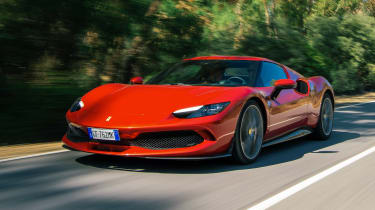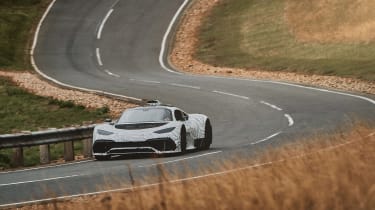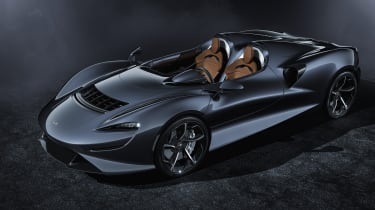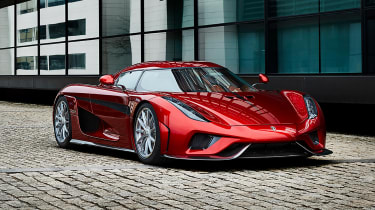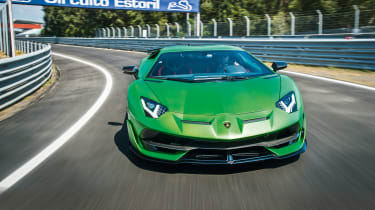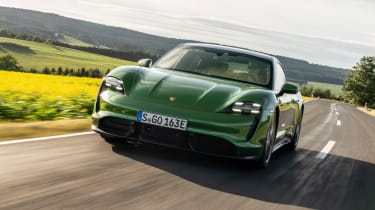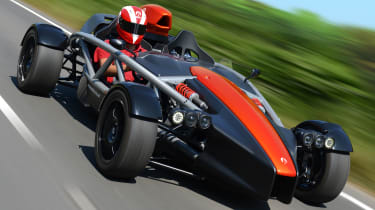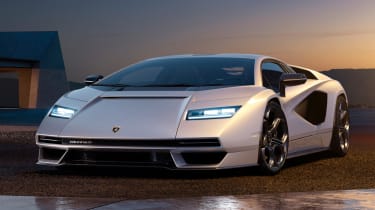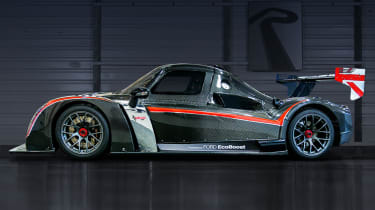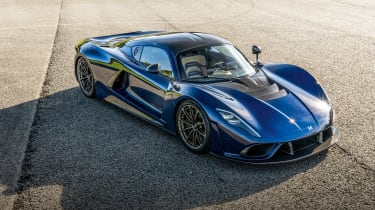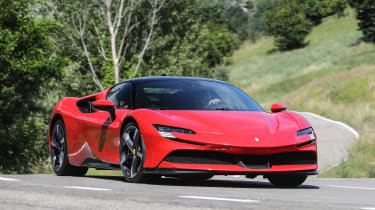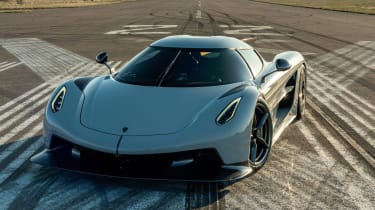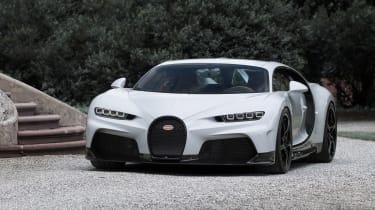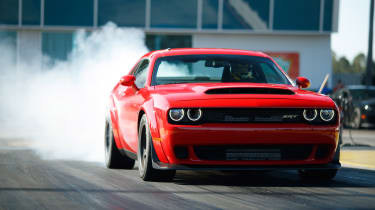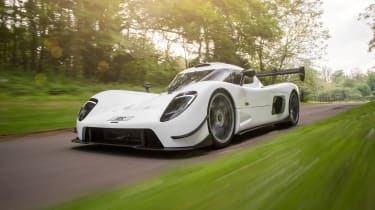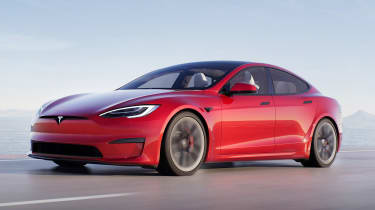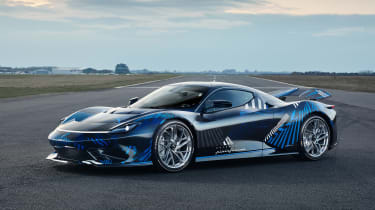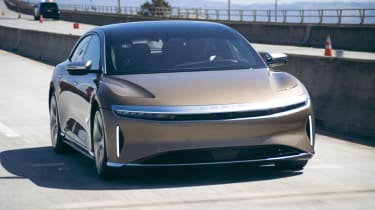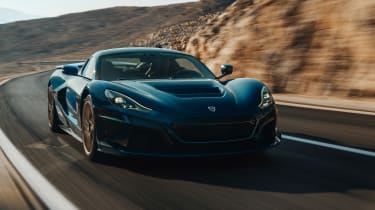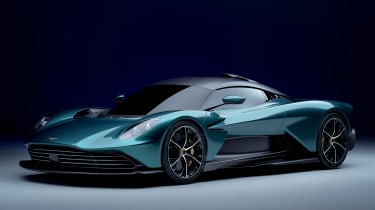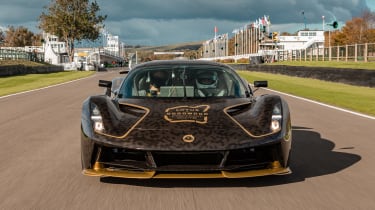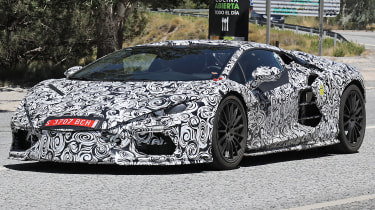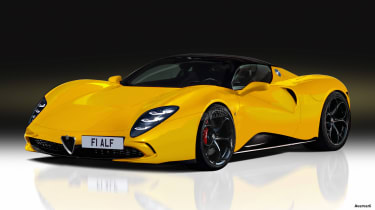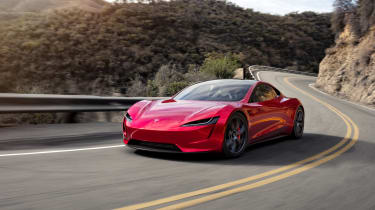Combustion-engined supercars are making a last stand against electrified machines with some incredible 0-60mph times, and cars generally have never been faster
The primal rush of pure acceleration never gets old, and manufacturers are continuing to chip away at 0-62mph times to bring us even faster, brain-scrambling supercars. It's not uncommon for today's models to dip under 3-seconds in the sprint to 62mph, although for the new generation of electric performance cars, sub-2 second times are within reach.
What is the fastest car in the world? World's fastest production cars 2022 / 2023
To paint a picture of performance cars in 2023, we've devised a list of the fastest accelerating cars that money can buy, using each manufacturer's claimed 0-62mph figure. Of course, the track surface, weather conditions and, indeed, the driver can swing these results significantly, and some car firms are more optimistic than others when measuring acceleration.
Short of gathering the world's quickest cars on an empty runway for the mother of all drag races, this list provides our best idea of the fastest accelerating cars in the world right now.
Fastest accelerating cars in the world
These are the fastest cars over the benchmark 0-60mph/0-62mph sprint, according to the manufacturers' official claims…
Ferrari 296 GTB – 2.9 seconds (0-62mph)
Today’s “entry-level” mid-engined Ferrari is anything but. The 296 GTB’s 250 LM-inspired body hides 819bhp of hybrid-powered fury, all of which is sent to the rear wheels. Traction is no doubt the limiting factor for its 0-62mph time, which still stands at an impressive 2.9 seconds. Ferrari has tuned the turbocharged V6 to echo the notes of its sonorous V12s, so it sounds brilliant in the process, too.
Mercedes-AMG One – 2.9 seconds (0-62mph)
Costing well over £2 million and with a 1.6-litre V6 hybrid powertrain borrowed from a Formula 1 car, you might expect the AMG One to be right at the sharp end of this list. Its 1,695kg kerb weight does it no favours, but with a colossal 1,049bhp on tap, the One is still blindingly quick. With active aero and four wheel drive, it blitzed the production car lap record at the Nurburgring, with a time of 6:35.183.
Mclaren Elva – 2.8 seconds (0-62mph)
Harking back to classic open top McLaren race cars, the roofless Elva delivers an assault on the senses on its way to 62mph. It’s the firm’s lightest model, utilising a similar carbon fibre chassis and twin-turbo V8 engine to other McLaren road cars. In this application, it produces a thumping 802bhp – enough for a top speed of 203mph.
Caterham Seven 620R – 2.8 seconds (0-60mph)
The styling is old-school, but not the performance. Underneath the iconic 7 body is a supercharged 2.0-litre 4-cylinder Ford Duratec, and while this may sound rather small compared to the majority on this list, do not be fooled as the 620R weighs a mere 610kg.
Koenigsegg Regera – 2.8 seconds (0-62mph)
An excellent example of how hybrid technology isn’t just for reducing emissions. The 5.0-litre twin-turbo V8 and a trio of electric motors provide the power in Koenigsegg’s hypercar, while the brand-new ‘Autoskin’ system ensures that the Regera has the aerodynamics to match.
Lamborghini Aventador SVJ – 2.8 seconds (0-62mph)
For those moments when a regular, V12 Lamborghini just doesn’t cut it for you, the SVJ takes the Aventador to the next level. Improved aerodynamics and weight reduction allow the glorious 6.5-litre V12 to perform just that little bit better.
Porsche Taycan Turbo S – 2.8 seconds (0-62mph)
Some were concerned when Porsche announced its first fully-electric model in 2019, and there were even claims that it ‘wouldn’t be a proper Porsche’. In fact, the Taycan is an enjoyable drive, reasonably practical and the Turbo S model achieves 0-60 in 2.8 seconds. So the brand’s answer to these concerns is pretty clear.
Ariel Atom 4 – 2.8 seconds (0-60mph)
The last generation of Atom doesn’t look much different on the surface from the previous three versions – it still doesn’t have any doors or windows, and it’s this lack of creature comforts that makes the Atom great at what it does. Powered by a 320bhp version of the Honda Civic Type-R’s turbocharged 2.0-litre, the flyweight Atom is one of the fastest and thrilling driver’s cars on road or track.
Lamborghini Countach LPI 800-4 – 2.8 seconds (0-62mph)
Lamborghini revived an iconic nameplate with the new Countach, but it arrives with performance on an entirely different plane to the original. Using hybrid engine tech derived from the Sian hypercar, the reborn Countach produces 803bhp from its wailing V12, firing the wedge-shaped homage across the ground at speeds of up to 220mph.
Radical RXC GT – 2.7 seconds (0-60mph)
Radical’s cars are exactly that – radical. The RXC GT is probably the most extreme of all, channelling all sorts of prototype race car DNA having been built off the back of Radical’s SR9 Le Mans project. Generating 900kg of downforce, it’s hard to believe this car is road legal. But it is.
Porsche 911 Turbo S (with Sport Chrono package) – 2.7 seconds (0-62mph)
When a car exists in some form for well over half a century, it has to be doing something right. The latest version of the legend from 1963 is the 992, which was first revealed to the world in 2018. All 992s will achieve 0-60 in under 4.5 seconds, but the Turbo S is currently the fastest. Opt for the Sport Chrono package and it will see 62mph in 2.7s.
Hennessey Venom F5 – 2.6 seconds (0-60mph)
Hennessey earned its stripes creating monstrous, modified versions of already ballistic performance cars, and the F5 represents all of the firm’s knowhow distilled into a V8-powered, 1,792bhp package. Weighing less than today’s BMW 3 Series, the F5 has been engineered to perform on track, and its yet-to-be-verified 311mph+ top speed could cement it in the history books as the world’s fastest road car.
Ferrari SF90 Stradale – 2.5 seconds (0-62mph)
The first ever Plug-in Hybrid Electric Ferrari is yet another example of the brilliant matching of internal combustion and electricity that’s becoming commonplace in the modern hypercar world. The SF90 is a strong counter-argument to the phrase ‘there’s no replacement for displacement’, as it will accelerate from 0-60mph 0.4 seconds faster than the 812 Superfast, even though it has 4 fewer cylinders.
Koenigsegg Jesko – 2.5 seconds (0-60mph)
The fact that the latest and greatest Koenigegg isn’t closer to the top of this list serves as a reminder of the booming hypercar market in 2022. Competitors are arriving from all angles, and with the Jesko, the Swedish manufacturer is embarking on its next era. Powered by a raucous 1,600bhp twin-turbocharged V8, the rear-wheel drive Jesko simply isn’t able to extract any more acceleration from two driven wheels, but it’s all the more thrilling because of that.
Bugatti Chiron Super Sport – 2.4 seconds (0-62mph)
To fend off the onslaught of all-electric hypercar rivals, Bugatti is squeezing everything from its 8.0-litre W12 engine, and the Chiron Super Sport is the fastest Bugatti of them all. It’s a development of the record breaking, 304mph 300+ model, and packs an astonishing 1,578bhp and 1,600Nm of torque. It may lack the wild, bespoke exterior of the limited-run Divo, but it certainly isn’t wanting for pace.
Dodge Challenger SRT Demon – 2.3 seconds (0-60mph)
The 829bhp Challenger SRT Demon caused a storm when it was launched, partly because of its claim to be the fastest production car to 60mph, but also because it had a tendency to lift its front wheels off the ground in the process. Although it can hit 60mph in its claimed 2.3 seconds, it does require changing a lot of the standard car, including the tyres and even the type of fuel it runs on, all of which comes at an additional cost of $1.
Ultima RS LT5 – 2.3 seconds (0-60mph)
Not to be outdone, Ultima is actually responsible for two of the three fastest cars on this list. Ultima’s cars are powered by Chevrolet’s infamous LS V8, with the LT5’s engine being tuned to deliver a whopping 1,200bhp, in a car that weighs just 930kg. Also, the Evolution Coupe is what the brand is calling the ‘most sophisticated model ever’. Suspension and chassis revisions, a composite body, and 1,020bhp make for another road-legal car from Ultima that can absolutely dominate the track, too.
Tesla Model S Plaid – 1.98 seconds (0-60mph)
Elon Musk claimed the Tesla Model S Plaid – the latest and fastest evolution of the all-electric saloon – was the first production vehicle to dip below the two-second 0-60mph barrier. There’s a caveat, though, because the astonishing figures generated by its 1,006bhp not only require the Plaid to condition its battery and motor temperatures for a good few minutes prior to a launch, but the quickest figures were also recorded at a drag strip with a prepped surface and a one-foot rollout. Still, even without taking these measures, the Plaid is rumoured to hit 60mph in just under 2.3 seconds, laying waste to combustion-engined supercars.
Pininfarina Battista – 1.9 seconds (0-62mph)
While the Model S Plaid just manages a four-digit power figure, the Pininfarina Battista almost doubles it with an astonishing 1,873bhp powertrain – or 1.4 megawatts of power – and 2,300Nm of torque. Acceleration from 0-62mph takes just 1.9 seconds, and in 12 seconds – the time it takes a family SUV to get to 62mph – the Battista is travelling at 186mph. Unlike the tri-motor Tesla, the Battista has four in total: two 335bhp front motors and two 603bhp rear motors for unparalleled acceleration.
Lucid Air Sapphire – 1.89 seconds (0-60mph)
Lucid is a newcomer to the performance EV market, but straight off the bat, it’s shown a clean pair of heels to established marques. The Air Sapphire saloon uses a triple electric motor setup to haul itself to 60mph in just 1.89 seconds, putting it just shy of the Rimac Nevera. For a car that can carry a family and their luggage in comfort, that’s deeply impressive.
Rimac Nevera – 1.85 seconds (0-60mph)
The 1,888bhp Rimac Nevera represents the pinnacle of current hypercar technology, and with a 0-60mph time of 1.85 seconds, it produces the numbers to show for it. Sharing its platform and powertrain tech with the Pininfarina Battista, the Nevera carries its eye-watering pace through to a top speed of 258mph, making it the fastest EV in history. With only its second bespoke model, the Croatian brand has laid down quite a marker.
Fastest accelerating cars: full list
- Rimac Nevera – 1.85 seconds (0-60mph)
- Lucid Air Sapphire – 1.89 seconds (0-60mph)
- Pininfarina Battista – 1.9 seconds (0-62mph)
- Tesla Model S Plaid – 2.3 seconds (0-60mph)
- Ultima Evolution Coupe (supercharged) & Ultima RS LT5 – 2.3 seconds (0-60mph)
- Dodge Challenger SRT Demon – 2.3 seconds (0-60mph)
- Bugatti Chiron Super Sport – 2.4 seconds (0-62mph)
- Koenigsegg Jesko – 2.5 seconds (0-60mph)
- Ferrari SF90 Stradale – 2.5 seconds (0-62mph)
- Hennessey Venom F5 – 2.6 seconds (0-60mph)
- Porsche 911 Turbo S (Sport Chrono package) – 2.7 seconds (0-62mph)
- Radical RXC GT – 2.7 seconds (0-60mph)
- Lamborghini Countach LPI 800-4 – 2.8 seconds (0-62mph)
- Ariel Atom 4 – 2.8 seconds (0-60mph)
- Porsche Taycan Turbo S – 2.8 seconds (0-62mph)
- Lamborghini Aventador SVJ – 2.8 seconds (0-62mph)
- Koenigsegg Regera – 2.8 seconds (0-62mph)
- Caterham Seven 620R – 2.8 seconds (0-60mph)
- Mclaren Elva – 2.8 seconds (0-62mph)
- Mercedes-AMG One – 2.9-seconds (0-62mph)
- Ferrari 296 GTB – 2.9 seconds (0-62mph)
Future cars to look out for
Each passing year sees a new batch of sports, super and hyper cars attempt to be faster and more powerful than their rivals. This constantly raises the bar to the point that it can be tricky to keep pace. Below is a list of cars coming out over the next few years which could enter our list of fastest accelerating cars…
Aston Martin Valhalla
Otherwise known as Project AM-RB 003, Aston Martin’s upcoming Valhalla will be powered by a turbocharged V6 and a battery-electric hybrid system. This, mixed with an all carbon-fibre build, should result in a car with performance that’s almost as awesome as the name.
Lotus Evija
It certainly looks exciting enough, and a colossal 1,973bhp should easily give the Evija the performance to match. Current figures from Lotus are stating that the car will achieve 0-62mph in under 3.0 seconds, but it wouldn’t come as a surprise if it turns out to be even faster.
Lamborghini Aventador replacement
Sant’Agata’s flagship supercar is bowing out after eleven years of service, and Lamborghini is set to replace it with an even more powerful hybrid model. The new car will arrive with a mid-mounted V12 and four-wheel drive, and we’ve already spotted it in testing on public roads in pre-production form – it could knock a couple of tenths off the Countach’s 0-62mph time when it launches next year.
Alfa Romeo supercar
Alfa Romeo will return to the supercar fray with a new mid-engined challenger next year, which is likely to adopt an evolution of the twin-turbo V6 motor that powers its Quadrifoglio models. Inspired by the iconic 33 Stradale of the 1960s, the newcomer could use a carbon fibre chassis to minimise weight and maximise acceleration.
Tesla Roadster
Tesla’s upcoming Roadster looks to make some enormous improvements over the original from 2008. Improved production methods and technology mean that the brand is claiming a 1.9-second 0-60mph time, a 250mph top speed and over 600 miles of range. Will it deliver on these claims? We should hopefully find out next year.
Got a suggestion for a model we might have missed? Then make your case in the comments section below…
Source: Read Full Article
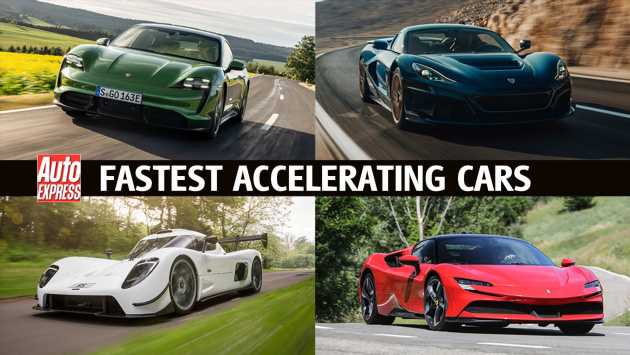

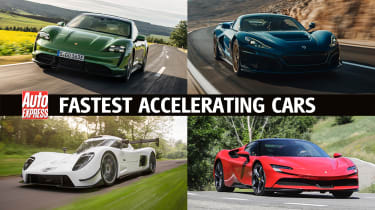
 What is the fastest car in the world? World's fastest production cars 2022 / 2023
What is the fastest car in the world? World's fastest production cars 2022 / 2023